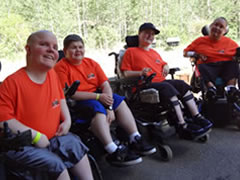About DMD
The National Institute for Health describes it as:
 Duchenne muscular dystrophy (DMD) is a genetic condition that affects the muscles, leading to muscle wasting that gets worse over time. DMD occurs primarily in males, though in rare cases may affect females. The symptoms of DMD include progressive weakness and loss (atrophy) of skeletal and heart muscles. Early signs of DMD may include delayed ability to sit, stand, or walk and difficulties learning to speak. Muscle weakness is usually noticeable in early childhood. Most children with DMD use a wheelchair by their early teens. Heart and breathing problems also begin in the teen years and lead to serious, life threatening complications. DMD is caused by genetic changes (DNA variants) in the DMD gene. DMD is inherited in an X-linked recessive pattern and may occur in people who do not have a family history of DMD. While there is no known cure for DMD, there are treatments that can help control symptoms.
Duchenne muscular dystrophy (DMD) is a genetic condition that affects the muscles, leading to muscle wasting that gets worse over time. DMD occurs primarily in males, though in rare cases may affect females. The symptoms of DMD include progressive weakness and loss (atrophy) of skeletal and heart muscles. Early signs of DMD may include delayed ability to sit, stand, or walk and difficulties learning to speak. Muscle weakness is usually noticeable in early childhood. Most children with DMD use a wheelchair by their early teens. Heart and breathing problems also begin in the teen years and lead to serious, life threatening complications. DMD is caused by genetic changes (DNA variants) in the DMD gene. DMD is inherited in an X-linked recessive pattern and may occur in people who do not have a family history of DMD. While there is no known cure for DMD, there are treatments that can help control symptoms.
